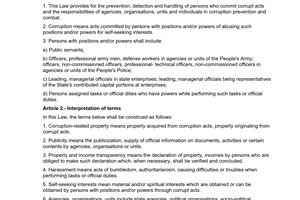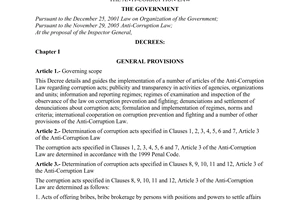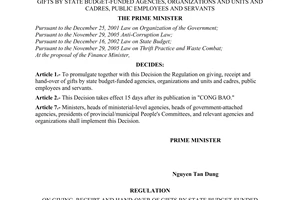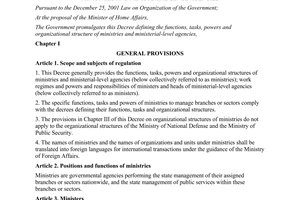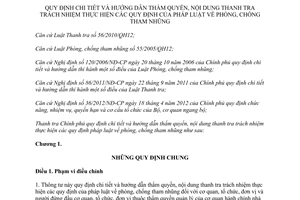Nội dung toàn văn Circular No. 02/2012/TT-TTCP stipulating in detail and guiding the competence
|
THE
GOVERNMENT INSPECTORATE |
SOCIALIST
REPUBLIC OF VIETNAM |
|
No. 02/2012/TT-TTCP |
Hanoi, July 13, 2012 |
CIRCULAR
STIPULATING IN DETAIL AND GUIDING THE COMPETENCE AND CONTENTS OF INSPECTION OF THE RESPONSIBILITY TO IMPLEMENT LEGAL PROVISIONS ON CORRUPTION PREVENTION AND FIGHTING
Pursuant to Inspection Law No. 56/2010/ QH12;
Pursuant to Anti-Corruption Law No. 55/ 2005/QH12;
Pursuant to the Government's Decree No. 120/2006/ND-CP dated October 20, 2006, stipulating in detail and guiding a number of articles of the Anti-Corruption Law;
Pursuant to the Government's Decree No. 86/2011/ND-CP dated September 22, 2011, detailing and guiding a number of articles of the Inspection Law;
Pursuant to the Government's Decree No. 36/2012/ND-CP dated April 18, 2012, defining the functions, tasks, powers and organizational structure of Ministries and ministerial-level agencies;
The Government Inspectorate stipulates in detail and guides the competence and contents of inspection of the responsibility to implement the anti-corruption law as follows:
Chapter I
GENERAL PROVISIONS
Article 1. Scope of regulation
1. This Circular stipulates in detail and guides the competence and contents of inspection of the responsibility to implement the anti-corruption law of agencies, organizations and units and heads of agencies, organizations and units under the management of state administrative agencies at all levels.
2. The order and procedures for inspection of the responsibility to implement the anti-corruption law comply with Section 1, Chapter III of the Government's Decree No. 86/2011/ ND-CP dated September 22, 2011, detailing and guiding the implementation of a number of articles of the Inspection Law and other regulations on inspection.
Article 2. Subjects of application
This Circular applies to the following subjects:
1. Heads of state administrative agencies, Heads of state inspectorates, heads and members of inspection teams of state administrative agencies when inspecting the responsibility to implement the anti-corruption law of agencies, organizations, units and individuals and heads of agencies, organizations and units;
2. Agencies, organizations, units and individuals related to the responsibility to implement the anti-corruption law.
Article 3. Responsibilities of heads of state administrative agencies
The heads of state administrative agencies shall, within the scope of their respective tasks and powers, organize, direct, guide, examine and urge the inspection of the responsibility to implement the anti-corruption law; solve difficulties and problems, promptly process the proposals of inspection teams; and conclude and organize the realization of inspection conclusions in accordance with law.
Chapter II
RESPONSIBILITY INSPECTION COMPETENCE
Article 4. Principles of determination of responsibility inspection competence
State inspectorates have competence to inspect the responsibility to implement the anti-corruption law of agencies, organizations, units and individuals and heads of specialized agencies, organizations or units falling under the management of state administration agencies of the same level, and subordinate state administration agencies and their heads.
Article 5. Competence of the Government Inspectorate
1. The Government Inspectorate may inspect the responsibility to implement the anti-corruption law of ministries, ministerial-level agencies and government-attached agencies (referred to as ministerial- level agencies), the People's Committees of provinces or centrally run cities (referred to as provincial-level People's Committees); and state enterprises set up under the Prime Minister's decisions.
2. In the course of inspecting the responsibility to implement the anti-corruption law of ministerial-level agencies, provincial-level People's Committees and state enterprises set up under the Prime Minister's decisions, the Government Inspectorate's inspection teams may examine and verify the implementation of the anti-corruption law by related agencies, organizations, units and individuals as follows:
a/ Ministerial offices and general departments, departments and units of ministries, and state enterprises established under decisions of ministers, heads of ministerial-level agencies or heads of government-attached agencies (referred to as ministers), and other agencies, organizations, units and individuals under the management of ministerial-level agencies;
b/ Offices and specialized agencies of provincial-level People's Committees (referred to as provincial-level departments), People's Committees of urban districts, rural districts, towns and provincial cities (referred to as district-level People's Committees), state enterprises established under decisions of provincial-level People's Committee chairmen and other agencies, organizations, units and individuals under the management of provincial-level People's Committees;
c/ Offices and professional bureaus and boards of state enterprises established under the Prime Minister's decisions and their attached organizations, units and individuals.
Article 6. Competence of ministerial inspectorates
1. The inspectorates of ministries and ministerial-level agencies (referred to as ministerial inspectorates) may inspect the responsibility to implement the anti-corruption law of agencies, organizations, units and individuals under the ministerial management; and state enterprises established under decisions of ministers.
2. In the course of inspection, inspection teams of ministerial inspectorates may examine and verify the implementation of the anti-corruption law by agencies, organizations, units and individuals under the ministerial management, and by state enterprises established under decisions of ministers, as follows:
a/ Ministerial offices, general departments, departments and units of ministries and other agencies, organizations, units and individuals under the ministerial management:
b/ Offices, specialized sections, divisions and units of state enterprises established under decisions of ministers and their affiliated organizations, units and individuals.
Offices, sections and divisions of business units of state-owned enterprises set up by the Minister's decision and other organizations, units and individuals under the management of that enterprise.
Article 7. Competence of provincial inspectorates
1. The inspectorates of provinces or centrally run cities (referred to as provincial inspectorates) may inspect the responsibility to implement the anti-corruption law of specialized agencies of provincial-level People's Committees (referred to as provincial-level departments); People's Committees of urban districts, rural districts, towns and provincial cities (referred to as district-level People's Committees); and state enterprises established under decisions of provincial-level People's Committee chairpersons.
2. In the course of inspection, inspection teams of provincial inspectorates may examine and verify the responsibility to implement the and-corruption law of agencies, organizations, units and individuals under the management of provincial-level departments, district-level People's Committees and state enterprises set up under decisions of provincial-level People's Committee chairmen, as follows:
a/ Offices and sections and divisions and specialized units under the service-level management and other agencies, organizations, units and individuals under the management of service-level management;
b/ Offices of district-level People's Committees and specialized sections and divisions attached to district-level People's Committees, the People's Committees of communes, wards or townships (referred to commune-level People's Committees) and other agencies, organizations, units and individuals under the management of district-level People's Committees;
c/ Offices and specialized sections, divisions and units of state enterprises set up under decisions of provincial-level People's Committee chairmen and other organizations, units and individuals under the management of those enterprises.
Article 8. Competence of service-level inspectorates
Inspectorates of specialized agencies of provincial-level People's Committees (referred to as provincial-level department inspectorates) may inspect the responsibility to implement the anti-corruption law of specialized agencies, organizations, units and individuals under the direct management of provincial departments.
Article 9. Competence of district-level inspectorates
1. Inspectorates of urban districts, rural districts, towns and provincial cities (referred to as district-level inspectorates) may inspect the responsibility to implement anti-corruption law of specialized agencies of district-level People's Committees and commune-level People's Committees.
2. In the course of inspection, inspection teams of district inspectorates may examine and verify the implementation of the anti-corruption law of agencies, organizations, units and individuals under the management of district-level People's Committees, as follows:
a/ Offices and specialized sections and divisions of district- level People's Committees and other agencies, organizations, units and individuals under the management of district-level People's Committees;
b/ Offices and specialized divisions of commune-level People's Committees and other units and individuals under the management of commune-level People's Committees.
Article 10. Competence to examine and verify other agencies, organizations, units and individuals
1. In the course of inspecting the responsibility to implement the anti-corruption law, inspection teams of state inspectorates, as required by inspections, may examine and verify other related agencies, organizations, units and individuals in addition to the agencies, organizations, units and individuals defined in Clause 2 of Articles 5,6,7 and 9 of this Circular in order to clarify the contents to be inspected.
2. Agencies, organizations, units and individuals related to the contents to be inspected shall work with, and provide information and documents at the request of inspection teams inspecting the responsibility to implement the provisions of anti-corruption law.
Chapter III
RESPONSIBILITY INSPECTION CONTENTS
Article 11. Principles of identification of inspection contents
1. Based on the state management requirements and plans on inspection of the implementation of the anti-corruption law, the competent agencies may inspect all or a number of contents defined in Article 31 of the Government's Decree No. 120/2006/ND-CP of October 20, 2006, detailing and guiding the implementation of a number of Anti-Corruption Law.
2. In addition to the contents guided in the Articles from 12 to 25 of this Circular, in case of inspection of the publicity and transparency of other activities, competent inspectorates shall, pursuant to the provisions of the Anti-Corruption Law concerning publicity and transparency and specialized laws on such fields, examine and assess and concurrently apply the provisions of this Circular to identify the contents of inspection of the publicity and transparency of those activities accordingly.
Section 1: INSPECTION OF THE RESPONSIBILITY TO IMPLEMENT THE ANTI-CORRUPTION LAW
Article 12. Inspection of the formulation and implementation of anti-corruption programs and plans
1. To examine and assess the formulation of anti-corruption programs and annual plans, the process of formulation, the time, duration and bases for the formulation of these plans, contents of these plans, and the guidance and direction on formulation of these programs and plans by agencies, organizations, units.
2. To examine and assess the organization of implementation of anti-corruption programs and plans, covering the forms and modes of plan publication and implementation; and the direction, guidance, inspection, examination and expedition of the implementation of these programs and plans.
Article 13. Inspection of the propaganda and dissemination of the Party's guidelines and policies and the State's laws against corruption
1. To examine and assess the formulation of propaganda programs and plans and the propaganda and dissemination of the Party's guidelines and policies and the State's laws against corruption; to examine the implementation by organizations, units and individuals according to regulations; to examine the coordination with related agencies, the building of the networks of communicators on the anti-corruption law and the results of implemented measures.
2. To examine the contents, forms, venues, time and subjects of propaganda and assess the effect and level of relevance to the specific organization and operations of each unit; and propaganda quality and results.
Article 14. Inspection of publicity and transparency of financial activities and state budget
1. Form of publicity and transparency applicable to each prescribed content.
2. Time of publicity of each prescribed content.
3. Issues of publicity and transparency to be examined:
a/ For budget estimating units: Publicity of allocation bases and principles; publicity of estimated and finalized figures;
b/ For estimating units directly using funds: Publicity of revenues contributed by organizations and individuals and their use efficiency; publicity of estimated figures for procurement of equipment and working facilities; publicity of expenses for fixed asset overhauls, conferences and other expenses;
c/ For organizations receiving state budget supports: Publicity of estimated and finalized figures; publicity of amounts (if any) contributed by organizations, individuals and their use; publicity of the bases for determination of support levels and support amounts given by the State;
d/ For funds originating from the state budget: Publicity of the operation regulations and financial mechanism of the funds; publicity of annual financial plans contain specific revenues and expenses related to the state budget according to regulations of competent authorities; publicity of results of the funds' operations; publicity of annual finalization statements approved by competent authorities;
e/ Publicity of the allocation and use of the state budget and assets to target projects and programs.
Article 15. Inspection of publicity and transparency in public procurement, capital construction and management of investment projects on construction
1. Form of publicity and transparency applicable to each prescribed content.
2. Time for publicity of each prescribed content.
3. Issues of publicity and transparency to be examined:
a/ In public procurement: Publicity of funds for and plans on procurement of state assets; publicity of plans for bidding, preliminary selection invitation and results of preliminary selection and bid invitation; publicity of lists of bidders in restricted biddings, publicity of short-listed bidders in restricted biddings, results of selection of contractors; publicity of the receipt of aid and donations and the transfer, liquidation, sale and assignment of state assets;
b/ In capital construction: Publicity of the allocation of investment capital in the state budget estimates allocated annually to projects; publicity of investment capital amounts of assigned projects in the annual budget estimates; publicity of plans for bidding, preliminary selection invitation and results; publicity of lists of bidders in restricted biddings, publicity of short-listed bidders in restricted biddings; publicity of annual finalization of investment capital of projects; publicity of the approval of finalization of investment capital of completed projects;
c/ In the management of construction investment projects: The gathering of comments of inhabitants in localities where construction investment projects are planned; the examination and decision on construction projects funded by local budgets; publicity of the implementation of construction investment projects after they are decided and approved for public supervision.
Article 16. Inspection of publicity and transparency of mobilization and use of amounts contributed by people
1. Publicity and transparency applicable to each prescribed content.
2. Time for publication of each prescribed content.
3. Issues of publicity and transparency to be examined:
a/ Publicity of the gathering of people's comments and decisions of the People's Councils of the same level in the mobilization of people's contributed amounts for investment in work construction and fun set up in localities;
b/ Publicity of the mobilization purpose, contribution levels, the use and using results and finalization reports;
c/ Publicity of infrastructure facilities in communes, wards or townships, which are financed by people's contributions: Publicity of contribution levels, the use, using results and finalization report; publicity of budget estimates for every work according to approved investment plans; publicity of investment capital source for every work; publicity of results of mobilization of every specific subject, mobilization time; publicity of results of selection of contractors already approved by competent authorities; publicity of construction schedules and results of pre-acceptance test of completed volumes and quality and the finalization of works.
Article 17. Inspection of publicity and transparency in land administration and use
1. Publicity and transparency applicable to each prescribed content.
2. Time of publicity of each prescribed content.
3. Issues of publicity and transparency to be examined:
a/ Publicity and transparency of laws and regulations;
b/ Publicity and transparency of project appraisal and approval procedures; project bidding or land use right auctions for selection of contractors according to the land law and other regulations of the State;
c/ Publicity and transparency of the order of land recovery, ground clearance and resettlement; publicity of the process of formulating and revising land use master plans and plans;
d/ Publicity and transparency in the grant of land use right certificates regarding: the competence, order, procedure and grant of land use right certificates; publicity of detailed plans and land lot allocation, subjects to be allocated land for building houses;
e/ Publicity and transparency of land use master plans and plans: Examination and assessment of land administration and use against the approved land use master plans and plans; publicity of results of management of land allocation, lease and recovery and change of land use purpose;
f/ Publicity and transparency of other administrative procedures related to the state administration of land.
Article 18. Inspection of publicity and transparency of the handling of affairs by agencies, organizations, units and individuals
1. Publicity and transparency applicable to each prescribed content.
2. Time of publicity of each prescribed content.
Publicity contents for agencies, organizations and individuals with management competence in the fields of housing, land, construction, business registration, project examination and approval, state budget allocation, credit, banking, export, import, exit, entry, household registration, taxation, customs, insurance, and other agencies, organizations and individuals directly handling affairs of inspected agencies, organizations, units and individuals should cover the examination and assessment of the observance and implementation of regulations on publicity:
Publicity of administrative procedures for settlement; publicity of settlement time limits; publicity of the settlement order and procedures; and publicity of results of settlement of affairs of agencies, organizations, units and individuals.
Article 19. Inspection of publicity and transparency in organization and personnel work
1. Publicity and transparency applicable to each prescribed content.
2. Time of publicity of each prescribed content.
3. Issues of publicity and transparency to be examined:
a/ Publicity of the recruitment of cadres, civil servants, public employees and laborers into agencies, organizations and units; publicity of the number of persons to be recruited, criteria, forms and results of recruitment.
b/ Publicity of master plans on training, appointment, rank promotion, rotation, transfer, commendation, dismissal, relief from duty or office, disciplining and retirement of cadres, civil servants, public employees and other laborers.
Article 20. Inspection of the formulation and implementation of regimes, norms and standards
1. To examine the formulation and promulgation and publicity of regimes, norms and standards applicable to cadres, civil servants, public employees and laborers of agencies, organizations or units; to examine the grounds for formulation and the time of application according to regulations; to examine regulations on regimes, norms and standards implemented by agencies, organizations and units compared with the State's regulations.
2. To examine the guidance and organization of implementation of regulations on regimes, norms and standards; to examine the inspection, observance and revision of regulations that are unsuitable to reality in the implementation of regulations on regimes, norms and standards (if any); to examine the handling of violations of regulations on regimes, norms and standards (if any).
Article 21. Inspection of the implementation of the code of conduct and rules of professional ethics
1. The formulation and study of the code of conduct and rules of professional ethics in agencies, organizations or units according to regulations.
2. Publicity of the code of conduct and rules of professional ethics of cadres, civil servants and public employees for people's supervision of their observance according to regulations.
3. The observance of regulations on prohibitions on cadres, civil servants and public employees.
4. The examination and handling of violators of the code of conduct and rules of professional ethics and regulations on prohibitions on cadres, civil servants and public employees.
Article 22. Inspection of the shift of working positions of civil servants and public employees
1. To examine the formulation and publicity of plans, the observance of principles and prohibited acts in the periodical shift of working positions; to examine the contents and forms of periodical shift of working positions; to examine the subjects of shift; to examine the duration of periodical shifts of working positions; to examine the time of issuance of decisions on transfer, publicity of transfer decisions.
To examine cases of violation of regulations on shifts of working positions of cadres, civil servants and public employees (if any): To examine cases of non-shift of working positions according to regulations; to examine cases of shift contrary to the list of working positions in the fields, sectors and occupations requiring periodical shift; to examine the reasons for failure to implement the periodical shift of working positions.
2. To examine the guidance, examination and urge of agencies, organizations, units and individuals under management in the formulation of plans on, organization and implementation of, the shift of working positions for cadres, civil servants and public employees.
Article 23. Inspection of the implementation of regulations on presentation, acceptance and handover of gifts
1. To examine the dissemination, guidance and direction of the implementation of regulations on presentation, acceptance and handover of gifts by agencies, organizations and units funded by the state budget and by cadres, civil servants and public employees according to Decision No. 64/2007/QD-TTg of May 10, 2007 of the Prime Minister.
2. To examine the implementation of regulations on presentation, acceptance and hand-over of gifts by cadres, civil servants and public employees according to the State's regulations.
3. To examine the acceptance and use of gifts presented by agencies, organizations, units or individuals to agencies, organizations or units and the use of public funds for purchase of gifts according to the State's regulations.
4. To examine the handling of violations of regulations on the presentation, acceptance and handover of gifts (if any).
Article 24. Inspection of transparency of property and incomes
The contents of inspection of the implementation of regulations on transparency of property and incomes of cadres, civil servants and public employees focus on the following matters:
1. Organization and implementation of regulations on property and income declaration: Dissemination of the purpose of property and income declaration; drawing up and announcement of the lists of persons obliged to make such declaration; announcement of types of property and incomes to be declared; implementation of property and income declaration process and procedures; publicity of written property and income declarations; and management of the exploitation and use of written declarations of property and income.
2. Verification of property and incomes (if any): Based on the property and income verification requirements; implementation of property and income- verifying process and procedures, and conclusions on the transparency in property and income declarations of persons obliged to make declarations; management and use of property and income verification dossiers.
3. The handling of violations of regulations on transparency of property and incomes (if any) must take into account:
a/ The administrative disciplining of dishonest property and income declarers;
b/ The handling of violators of regulations on organization and implementation of property and income declarations; publicity of written property and income declarations; property and income verification; conclusion on transparency in property and income declaration; management and use of property and income transparency dossiers; implementation of the regime of reporting on results of implementation of property and income transparency according to regulations.
Article 25. Inspection of administrative reform
1. To examine the reform and improvement of administrative procedures; to examine the application of sciences to and renovation of technologies in management and administration activities; to examine the decentralization of powers to agencies, organizations, units and individuals for their higher autonomy and self-accountability; to examine the determination of the responsibility of each title holder.
2. To examine and assess the situation and results of decentralization by superior administrative agencies to subordinate administrative agencies; to examine the definition of tasks and powers of state agencies compared with the management requirements of localities or units.
3. To examine the renewal of payment modes, aiming to minimize payment in cash; the practical effects of the reform of administrative procedures; to examine the technology renovation in professional activities; to examine beneficiaries of the solutions and social effects.
4. To examine and assess the implementation of the sets of administrative procedures promulgated for each field as prescribed; the implementation of regulations on the one-stop mechanism.
5. To examine the administrative reform against the requirements of publicity and simplification aiming to prevent corruption, the number of specific administrative procedures slashed, amended or supplemented and the number of administrative procedures reformed; to assess typical reformed administrative procedures; to determine the economic and social values brought about by the administrative procedure reforms.
Section 2: INSPECTION OF RESPONSIBILITY TO IMPLEMENT REGULATIONS ON CORRUPTION DETECTION AND HANDLING
Article 26. Inspection of the handling of reports on and the settlement of denunciations of corruption acts
To examine the establishment and publicity of forms of receiving reports on signs of corruption and denunciations of corruption acts; to examine the responsibilities of organizations and individuals in the receipt of and the competence to accept denunciations of corruption acts; to examine the order and procedures for settlement of denunciations of corruption acts; to examine agencies, organizations, units and competent persons in the coordination in the receipt and handling of reports on and the settlement of denunciations of corruption acts.
Article 27. Inspection of the detection and handling of persons committing corruption acts
1. To examine the detection of corruption acts committed by cadres, civil servants and public employees under direct management via activities of management, receipt and handling of reports on signs of corruption.
2. To examine the handling of persons committing corruption acts by their managing agencies, organizations or units through activities of examination, inspection and settlement of denunciations of corruption acts: The number of cases and the number of corrupt persons to be handled and the results of handling of each specific case; handling forms and levels compared with the gravity of violations; the number of cases and number of persons to be administratively disciplined or their dossiers to be transferred to investigation bodies for criminal handling. The detailed data on handling results include:
a/ Administrative handling: A number of cases and number of corrupt persons to be administratively disciplined;
b/ Criminal handling: A number of cases and number of corrupt persons to be transferred to investigation bodies for penal liability examination;
c/ Economic handling: Amounts of money, property and land to be recovered and already recovered for the State, collectives, organizations or individuals; the sanctioning, compensations, repayment of money and property;
3. To examine and assess positive changes and limitations and existing problems in the detection and handling of corruption acts and the causes.
Article 28. Inspection of the realization of handling proposals and decisions
1. The examination of implementation of corruption-handling proposals and decisions and conclusions on inspection, examination, investigation, audit and judgments against agencies, organizations or units handled by functional state agencies should take into account: The organization of implementation and implementation of conclusions, handling proposals and decisions; results of implementation of conclusions, handling proposals and decisions.
2. To examine the monitoring, urge, examination and observance of information and reporting regimes in the course of implementation of conclusions, handling proposals and decisions of competent agencies or organizations.
Article 29. Inspection of the exercise of competence to examine and inspect the responsibility to implement the anti-corruption law
1. To consider the formulation and approval of plans on examination and inspection and the implementation of annual plans on examination and inspection of the implementation of the anti-corruption law by agencies, organizations, units and individuals under their management.
2. To examine the issuance of decision on examinations and inspections (forms, contents and modes of issuance); consider the exercise of examination and inspection
(Orders, procedures, results) on regular and irregular (if any) basis already carried out as compared with the plans and management requirements.
Article 30. Inspection of the observance of anti-corruption information and reporting regulations
1. To examine the implementation of regimes of information and periodical, special and extraordinary reporting on anti-corruption activities through criteria on the forms, quantity, time, contents and quality of information and reports.
2. To examine the advantages and disadvantages, difficulties and problems (if any) in the implementation of information and reporting regimes.
Article 31. Inspection of the responsibility handling of heads of agencies, organizations or units upon the occurrence of corruption under their management
1. The examination and handling of heads of agencies, organizations or units who are personally or jointly responsible for the occurrence of corruption in their agencies, organizations or units comply with Article 55 of the Anti-Corruption Law.
2. The examination and conclusion on the responsibilities of heads of agencies, organizations or units in organizing and directing of the implementation of law on anti-corruption.
Chapter IV
IMPLEMENTATION PROVISIONS
Article 32. Effect
1. This Circular takes effect on September 3, 2012.
2. Any problems and new matters arising in the course of implementation should be promptly reported to the Government Inspectorate for guidance or amendment and supplementation.-
|
|
INSPECTOR GENERAL |
------------------------------------------------------------------------------------------------------
This translation is made by LawSoft and
for reference purposes only. Its copyright is owned by LawSoft
and protected under Clause 2, Article 14 of the Law on Intellectual Property.Your comments are always welcomed
